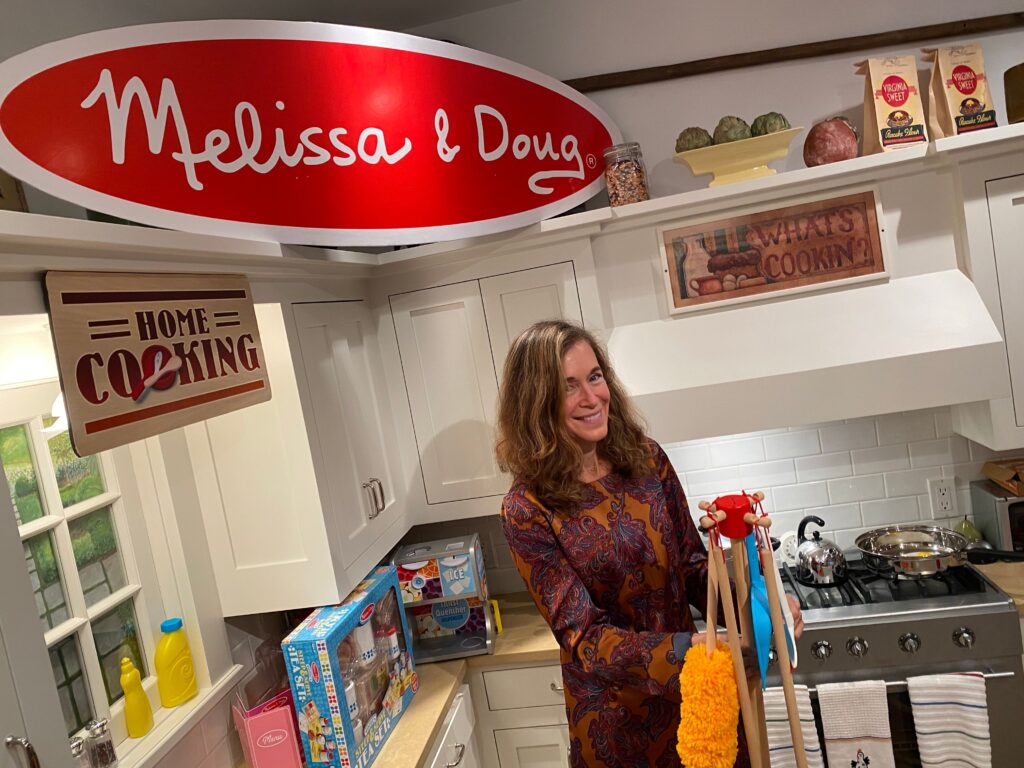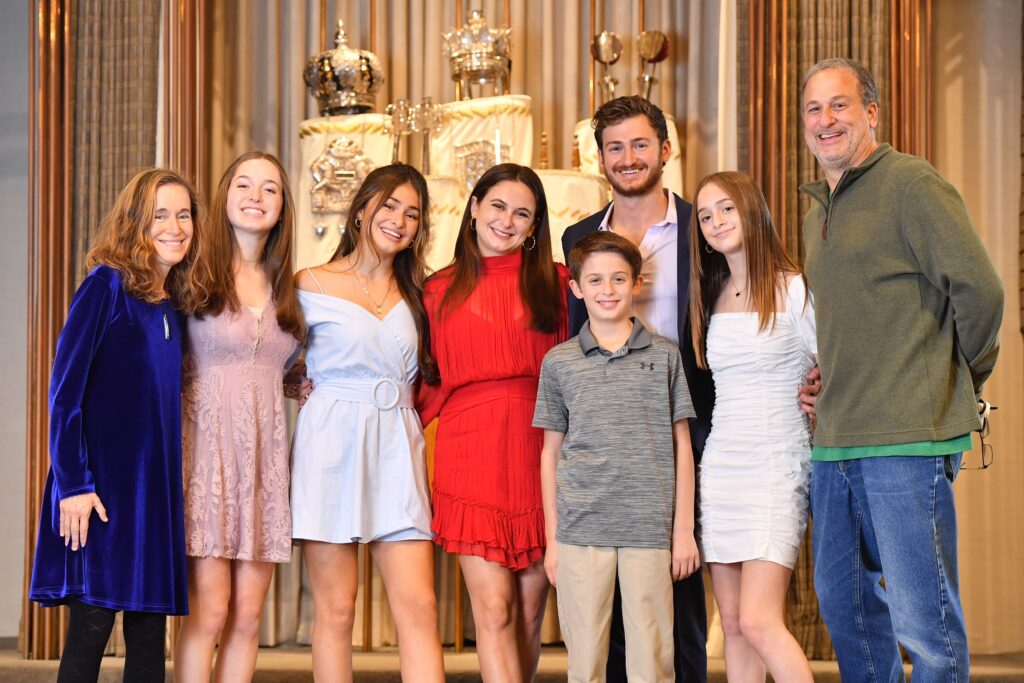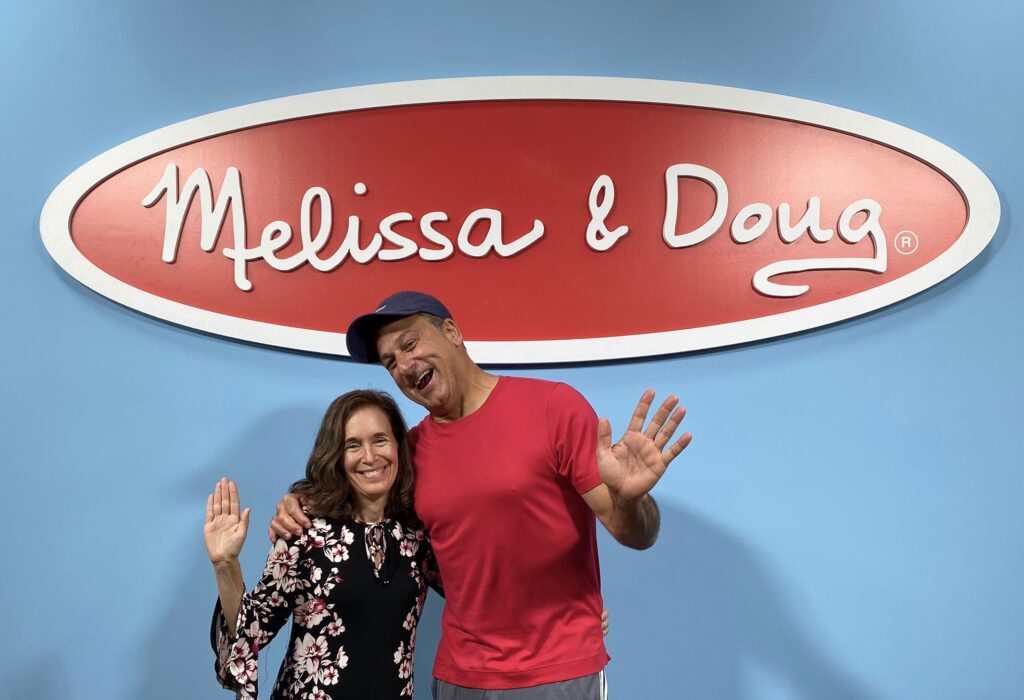Being Jewish
Personality
Melissa & Doug Founder on Depression, Building an Empire
In the early years of their toy company, Melissa and Doug Bernstein put their Westport, Conn., phone number on every Melissa & Doug product, from wooden play pizzas to miniature cars. They kept their telephone near their bed and always picked up, no matter the hour.

“Those calls were the most important things in the world to us, because they meant people actually bought our products and cared enough to call us,” recalls Melissa Bernstein, who says that she still responds to every message. “We treated our customers like they were family—and a lot of them became family to us.”
For Melissa, the toy business is personal, but her new venture is even more so. She has just self-published LifeLines, a memoir of confronting her crippling existential depression, and launched a companion website, lifelines.com, that she hopes will be a communal resource for those suffering from depression and anxiety.
“I built this $500-million company, I had six kids and I hid it all,” Melissa, 55, says of her mental health issues. “I gave the impression my life was perfect. But perfectionism is a game you can never win.”

“I took this journey that was so profound myself,” explains Melissa. “Now I want to help others make the same journey.”
While her vow to speak personally to anyone who reaches out on the LifeLines website may strain credulity, her natural candor is disarming. Minutes into our first Zoom conversation, confiding about the strains of pandemic parenting, I felt like I was chatting with a long-lost and very dear friend. A few days later, a handwritten note arrived, taped to an advance copy of her book. When she invited me to reach out any time about parenting or whatever else, I knew she meant it.
“She does mean it,” confirms Doug Bernstein, who is as equally open and warm as his wife. The couple was set up by their mothers—Connecticut friends both named Barbara. The women encouraged Melissa and Doug to get together when the pair was in college, she at Duke, he at the University of Connecticut.
“I called her and we talked for six hours,” Doug, 57, recalls of their first conversation. When they married in 1992, they had already started the Wilton, Conn.-based business that would eventually become a household name, with Melissa serving to this day as Chief Creative Officer and Doug at first overseeing operations. Today, he is chairman of the board.
Doug “is my bashert,” says Melissa. “We’re like two halves of the circle—and the great news is we’re not the same half.”
After college, both felt alienated in corporate jobs—she in investment banking, he in advertising. Toys were a natural choice for their independent venture: Both loved children and three of their four parents were educators. Their goal was to recreate the kinds of classic toys they had grown up with—wooden puzzles, dolls and vehicles—at accessible prices and with what Melissa calls the “pizazz” missing from modern versions.

One early hit was the Fuzzy Farm Puzzle, a wooden design with furry animal pieces. “We realized we can take a traditional category like puzzles that is so boring, dull and lackluster, add something like texture and really reinvent it,” explains Melissa. Incorporating everything from fur to buckles, puzzles became a huge best seller for the brand.
Despite tweaks here and there—the company introduced a number of Jewish holiday-themed puzzles and craft sets, but they didn’t sell well and are no longer in production—Melissa & Doug’s basic approach hasn’t changed in 32 years. “We’ve always believed in the joy of simple play that fosters imagination and allows for endless scenarios,” says Melissa. Primary colors and natural materials appeal to children of multiple ages and genders, along with their socially conscious parents. That philosophy has earned the toy line endorsements from such outlets as Good Housekeeping and Parents magazine.
Over the years, the product mix has evolved along with children’s fantasies of the grownup world. There are toy vacuum cleaners and sushi stations, grocery carts and stethoscopes, and costumes for aspiring hairdressers, firefighters, dentists and soldiers. Until shifting some of her focus to LifeLines this year, Melissa designed every toy herself, relishing the sensory details in doll hair or Velcro.
“Depressed people have a heightened sensitivity to sounds, touch and colors,” Melissa says of the trait she now considers an asset. “Making toys channels my darkness into something light and bright.”
As the product line expanded, the Bernsteins were lucky to have their children as in-house product testers: Brendan, 27; Ilana, 26; Audrey, 18; Sydelle, 16; Esther, 14; and Nathaniel, 13. When the children were younger, Melissa and Doug made unpacking boxes into a family game. “Whoever opens 50 boxes first gets a prize!” Doug remembers announcing when stock arrived on the weekend. Many of the brand’s most popular items were born of the Bernsteins’ own needs, like the sketching and coloring books that sustained the family through endless car trips.
“We were on the go so much,” Melissa explains of shuttling around her kids to various events. “We brought those activity pads wherever we went.”

youngest, Nathaniel’s, pandemic bar mitzvah, celebrated with only immediate family present. Photo courtesy of Melissa Bernstein.
The younger Bernsteins provided invaluable feedback. Melissa recalls a particular stuffed frog that looked smiley head-on to an adult but terrified her children with a sideways grimace. “They were responsible for so many changes we made,” Melissa notes, “because the way a child uses a toy is very different from the way an adult uses it.”
Brendan, now a hedge fund partner in Venice, Calif., remembers that despite the omnipresence of toys, “there was a real work-life separation” during his childhood. “My parents compartmentalize everything well, including my mom’s depression,” he says. Despite the fact that sisters Ilana and Audrey (who is taking a gap year from Yale) work full-time for LifeLines, Brendan says his mother’s illness remains a sensitive topic in the family. “I think that’s what my mom is trying to share with the world,” he reflects. “That everyone’s struggling a lot and afraid to talk about it.”
Melissa wasn’t sure how to address her illness when her diagnosis was confirmed by Loredana Trandu, the Fairfield, Conn.-based psychotherapist who has treated the toymaker for the past several years and is a consultant for LifeLines. The term existential depression itself does not appear in the American Psychiatric Association’s Diagnostic and Statistical Manual of Mental Disorders.
“There are just so many things that could be standalone diagnoses,” and the manual is already so long, explains Debra Kissen, a Chicago psychologist who is CEO of Light on Anxiety CBT (cognitive behavioral therapy) Treatment Centers. In her experience, existential fears often overlap with anxiety, depression, obsessive-compulsive and panic disorders. Kissen defines existential depression as “a thinking compulsion—a compulsive questioning of self, of reality and the point of life.”
And in a departure from clinical depression, Trandu says that “medication will not work for existential depression.”
“Depressed people have a heightened sensitivity to sounds, touch and colors. Making toys channels my darkness into something light and bright.”
When Melissa first heard the term existential depression, she recalls, “I realized there was a name for the way I felt my whole life—that I wasn’t alone.” Growing up the older of two children in a family that moved frequently, she lived in Pennsylvania and Colorado before settling in Westport. If often being the new kid, the only Jewish kid or the older sibling of a special-needs brother were sources of strain, she never felt she could express it. “I repressed so much of it,” Melissa says of her inner turmoil, which persisted even as she achieved outward success. “I was a fighter, a perfectionist. I couldn’t show anything negative.”
With LifeLines, which is being funded exclusively by the Bernsteins, Melissa has broken with that self-imposed pressure for everything to appear perfect. The free online community—staffed by 25 full-time employees and around 180 volunteers—offers discussion forums and videos featuring meditations and appearances from Melissa and a yoga healer. Events are being planned that will include retreats as well as activities that encourage expression, like painting and crafting. (Melissa’s many hobbies include jewelry-making, photography and collecting seashells.)

Ever the merchandiser, Melissa is working on a wellness product line that will feature individualized essential oils, a soothing sound machine and A LifeLine a Day—a chest containing 365 laminated cards printed with Melissa’s inspirational verses. Taking time to focus on oneself is “a luxury,” acknowledges the designer and busy mother. But she is convinced that cultivating self-acceptance, “rather than constantly reacting to external exigencies,” is what helped her find peace by clarifying her own life’s meaning and goals.
Pandemic quarantine has, of course, made that peace more elusive for many. A Centers for Disease Control and Prevention report from August 2020 revealed that roughly a quarter of Americans reported symptoms of anxiety and depression during the second quarter of 2020, up from eight and six percent reporting symptoms of those disorders, respectively, during the same period in 2019—a more than threefold increase. Families face additional burdens; Bernstein calls remote learning “a disaster that has made screen addicts of many kids.”
Parents everywhere will feel less guilty knowing that even the queen of wholesome, low-tech toys has struggled with technology during the pandemic. “I’ve got a member of the American Academy of Pediatrics on my board, and even I haven’t been able to control my kids’ screen time,” Melissa admits. Not that she hasn’t tried. When all six Bernstein offspring sheltered at the family home in Westport last spring, they hiked and sang, toasted s’mores over campfires, played Boggle and took turns cooking. (Melissa’s specialties are healthy desserts and matzah ball soup.)
An unexpected highlight was the bar mitzvah of the youngest Bernstein, Nathaniel, in December at Reform Temple Israel in Westport. With only immediate family present, “it was one of the warmest, most beautiful services ever, and so emotional because it was just us,” Melissa says. Judaism has taken on greater meaning for many people, she observes, as the pandemic has stripped daily life to its essentials. “You cling to the traditions, and more than with other religions, Jewish traditions take place in the house and around family,” she notes.
Theirs is the kind of large, close family Melissa fantasized about as an introverted child “whose best buddies were my imaginary friends,” she says, laughing. In contrast to today’s hyper-involved parenting culture, “it was an era when our parents didn’t play with us. They were making their own lives—better lives than their parents had. I had to figure out what to do with boredom, which is a useful skill.”
Both Melissa & Doug toys and, in a more tangential way, LifeLines are aimed at helping people cultivate that inner resourcefulness along with the joy and resilience that have seen Melissa through many a life chapter. It’s a lesson she hopes will resonate at any age. Using a favorite metaphor, Melissa says, “Painting that blank canvas takes work. But by sharing my vulnerabilities and my own experience, I want people to know that they can find fulfillment.”
Hilary Danailova writes about travel, culture, politics and lifestyle for numerous publications.










 Facebook
Facebook Instagram
Instagram Twitter
Twitter
Mona drooker says
What other magazines or papers does hillary write for? I used to read her travel column in the jewish week.